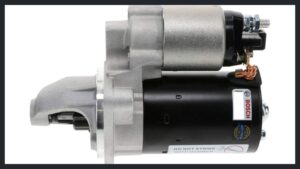
5 Symptoms of a Bad Starter
Every vehicle has a starter. The starter’s job is to spin the engine fast enough so that it can run under its own power. The starter is actually just an electric motor that can be controlled by the ignition.
When you turn the key in the ignition, the teeth on the starter mesh with the flywheel or flexplate, which turns the engine. The flywheel or flexplate is connected directly to the crankshaft, and as it spins, it draws air and fuel into the combustion chamber. On the other hand, the spark plug fires at precisely calculated intervals, igniting the fuel in the combustion chamber. This entire process is crucial for the engine to start and function properly.
Symptoms of a Failed Starter Motor
It is easy to identify a failed or broken starter motor if you know what to look for. The best thing to do when you first notice these symptoms is to have the starter motor inspected immediately.
WARNING: When troubleshooting your starter, be careful not to touch the thick cable that connects the battery positive terminal to the starter. This is a “hot” (contains live current) wire and can electrocute you. It’s best to disconnect the battery when working on your starter.
1) Vehicle won’t start
This is the most obvious clue. If the engine won’t start when you turn the ignition key, your starter solenoid may be damaged or worn. Check the small electrical connection to the starter to make sure it hasn’t come loose (it can come loose over time due to vehicle vibration).
If you drive an automatic vehicle, you should also check the neutral safety switch. This can be found in one of two places, either on the transmission itself or on the shifter column (under the console assembly), depending on your transmission connection type. This switch prevents your vehicle from starting when the shift lever is in gear (any position other than Park or Neutral).
2) Smoke from the engine compartment
If your vehicle emits a lot of smoke, your starter motor may have a short circuit. This causes the affected wire to heat up more than necessary, resulting in the emission of gray or black smoke from under the hood.
A short circuit is when current flows from a live or “hot” wire to a neutral wire (because it’s too close or actually touching), prematurely closing the circuit and bypassing the actual device (in this case, the starter motor).
3) Grinding noises
A series of gears connect the flywheel to the starter motor. If either component wears too much, it can cause grinding noises. A faulty starter motor can cause an internal grinding sound, and worn gears can also cause these noises.
Some faulty starters cause the starter gear to stay connected to the flywheel or flexplate even when the engine is running. This can cause grinding noises or sounds as if the car is still trying to start, even though it’s already running.
In either case, turn off your car’s engine immediately to avoid further damage. Take your vehicle to a mechanic to find out what issue is causing the grinding noise.
4) Freewheeling
If your engine won’t start and you hear a whirring noise from the starter, this is a condition called coasting. This indicates that the starter motor is spinning the starter gear but can’t make contact with the flywheel.
The starter solenoid is responsible for pushing the starter gear forward so it can engage the flywheel or flexplate. Freewheeling can occur if the starter can spin but the starter solenoid has failed.
5) Burning Smell
Whether you can see smoke coming from your car or not, if you smell a burning smell inside or outside your car when starting it up, your starter motor may be faulty. In most cases, this problem is accompanied by smoke and a burning smell at the same time.
There are many other issues that can cause a burning smell in and around your car, some of which may lead to dangerous situations (such as a car fire or brake failure). Other possible causes of the strange smell could be faulty wiring, faulty brakes or clutch, dirty or broken air conditioning, dripping oil due to a leak, etc.
Will my defective starter still work? Cranking refers to the repeated grinding or sputtering noise the engine makes for a few seconds when you turn the key.
Like all mechanical parts, starter motors gradually wear out over time. Unless your starter motor suddenly breaks, you’ll usually have a hard time starting the car before it stops working completely. At some point, the starter may stop starting at all (i.e. the engine will no longer crank). Although you can still start with a defective starter, it doesn’t have to be. If the starter solenoid is defective, the starter will not start the engine even if the starter motor is still good.

